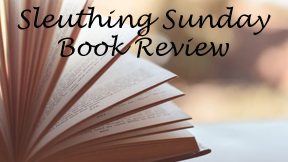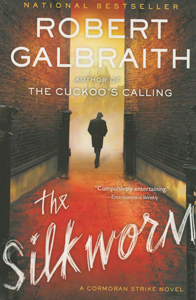In the “Harry Potter” series, J.K. Rowling was known for her imagination. In the “Cormoran Strike” mystery series, she writes what she knows, under the pseudonym Robert Galbraith. The first novel, “The Cuckoo’s Calling” (2013), was about celebrity life, and the second, “The Silkworm” (2014), is about the publishing industry.
The horrors of the publishing world
I imagine Rowling had just as many notes for “The Silkworm” as she famously did for the “Potter” mythology. The novel is packed with characters, clues and possibilities. I recall hearing that Agatha Christie planned five possible outcomes for her novels, then chose one and fleshed it out.
As such, the stories contain residue of four other possibilities. And therefore, a reader has plenty of things to latch on to – plenty of ways in which to be misdirected. I latched on to one possibility about midway through “The Silkworm,” and was ultimately blind to a huge clue right in front of me the whole time. A tip of my cap to Rowling for misdirection well done.

“The Silkworm” (2014)
Author: J.K. Rowling, writing as Robert Galbraith
Series: Cormoran Strike No. 2
Genre: Mystery
Setting: London, early 21st century
“The Silkworm” has such good characters – the ongoing lives and background-teases of huge one-legged detective Strike and his ambitious assistant Robin, plus a wild cast of suspects – that the solution almost doesn’t affect the reading pleasure.
Hopefully using her imagination more so than drawing from real life, Rowling takes us into the world of book publishing and some very troubled people in the industry. Initially it’s about the disappearance of Owen Quine, who wrote one acclaimed novel but has since churned out drivel. His latest – unpublishable due to potential libel – has leaked, a violence- and sex-laced fantasy novel filled with stand-ins for his professional enemies.
Searching the text
I love how Strike and Robin must search the text of “Bombyx Mori” for clues as to who would want revenge on Quine. Egotistical writers and editors willingly come to Strike to share their thoughts, and they are flattered with he asks for their analysis of the novel’s themes. Rowling darkly glamorizes publishing, and has some fun with the world of literary criticism. But meanwhile, Strike is reading between the lines, as we also must do to solve the case.
While “The Silkworm” isn’t quite to the level of the grotesqueries of Hannibal Lector creator Thomas Harris, it explores grim potentialities of unhinged yet intelligent humans. The “Potter” novels deliciously hinted at darkness, violence and death – the Forbidden Forest, the veil that Sirius Black disappears into, and so forth – and “The Silkworm” fully steps into that world. It comes through Quine’s imagination in “Bombyx Mori” and through the case itself.

Although she’s writing about real London here, and not an imagined Wizarding World, Rowling’s evocative details pay off just the same. Strike shambles through the snowy city; we’re always aware of his pained knee and his even more wince-inducing financial troubles. I like how his living quarters are in the uninsulated attic above his office, thus making work a symbolic refuge from the rest of his existence.
His lingering love for the nutso Charlotte (a bullet he dodged after 16 years, but the heart isn’t logical) adds tragic-romance heft. This relationship is balanced out by Robin’s grounded rift with her fiancée, Matthew, who is irked that Robin loves the low-paying field of detective work. Plus, he sees Strike as a romantic rival, something he’s (probably, mostly) wrong about.
Just as Quine disappears into fiction to explore darker impulses, Rowling disappeared behind the Galbraith moniker to become an A-list mystery writer. By her second novel, she had been outed, but that doesn’t at all make her shy or timid. “The Silkworm” is as confidently written and clued as high-level Christies, and it delves into never-before-so-dark corners of the author’s imagination.
Sleuthing Sunday reviews the works of Agatha Christie, along with other new and old classics of the mystery genre.

